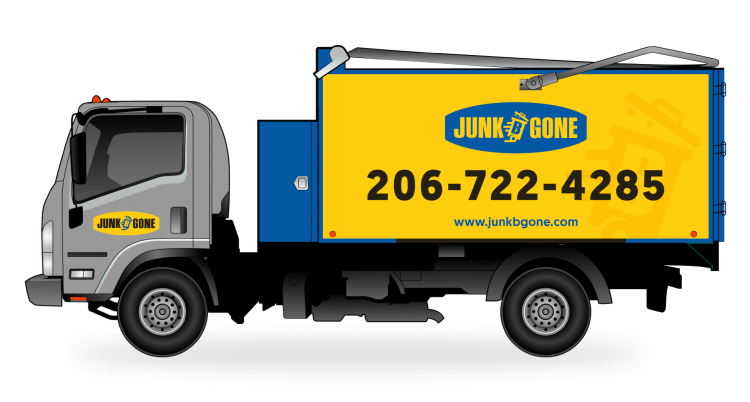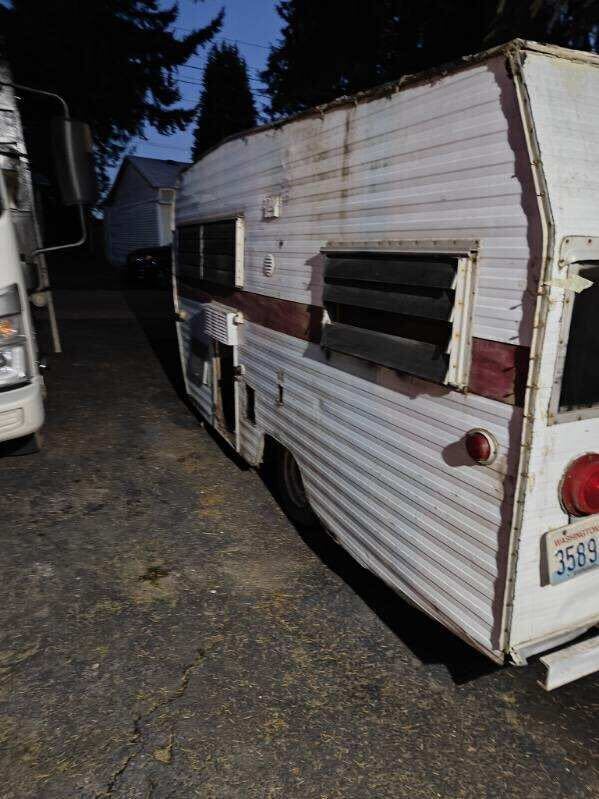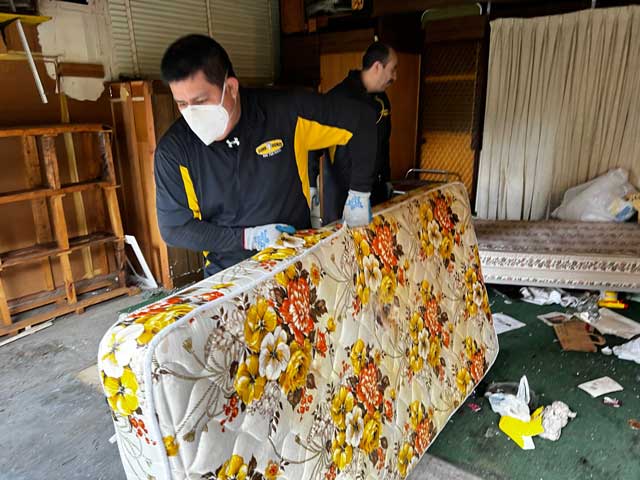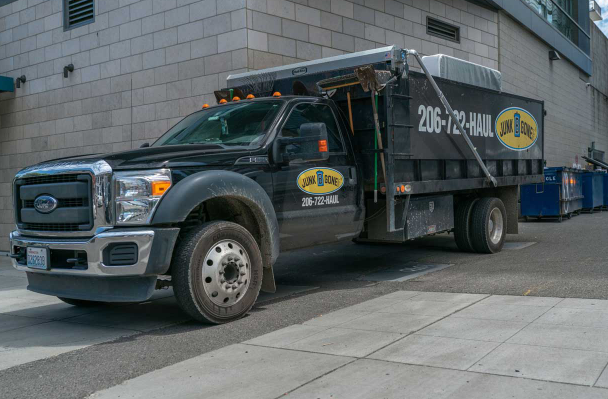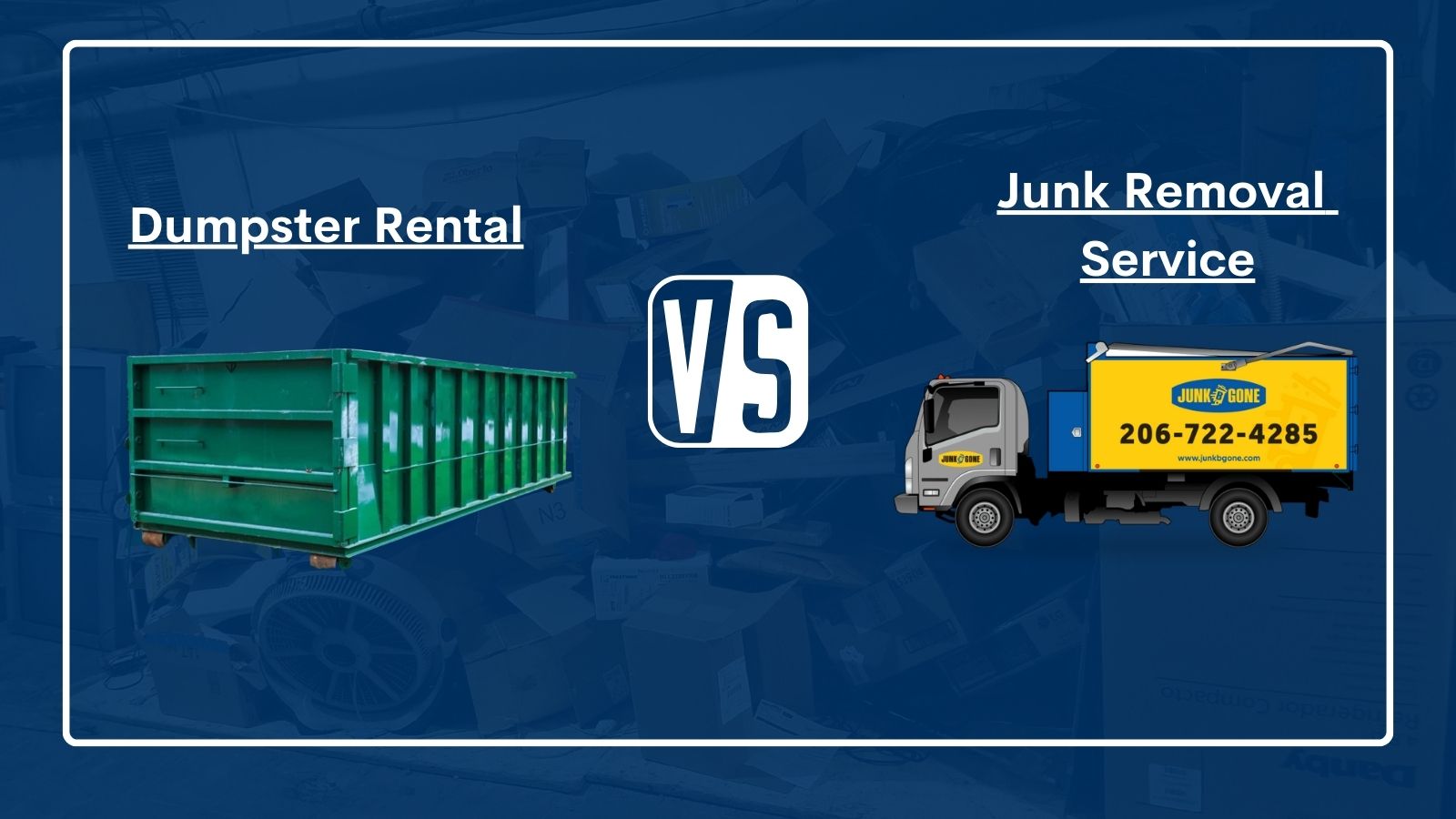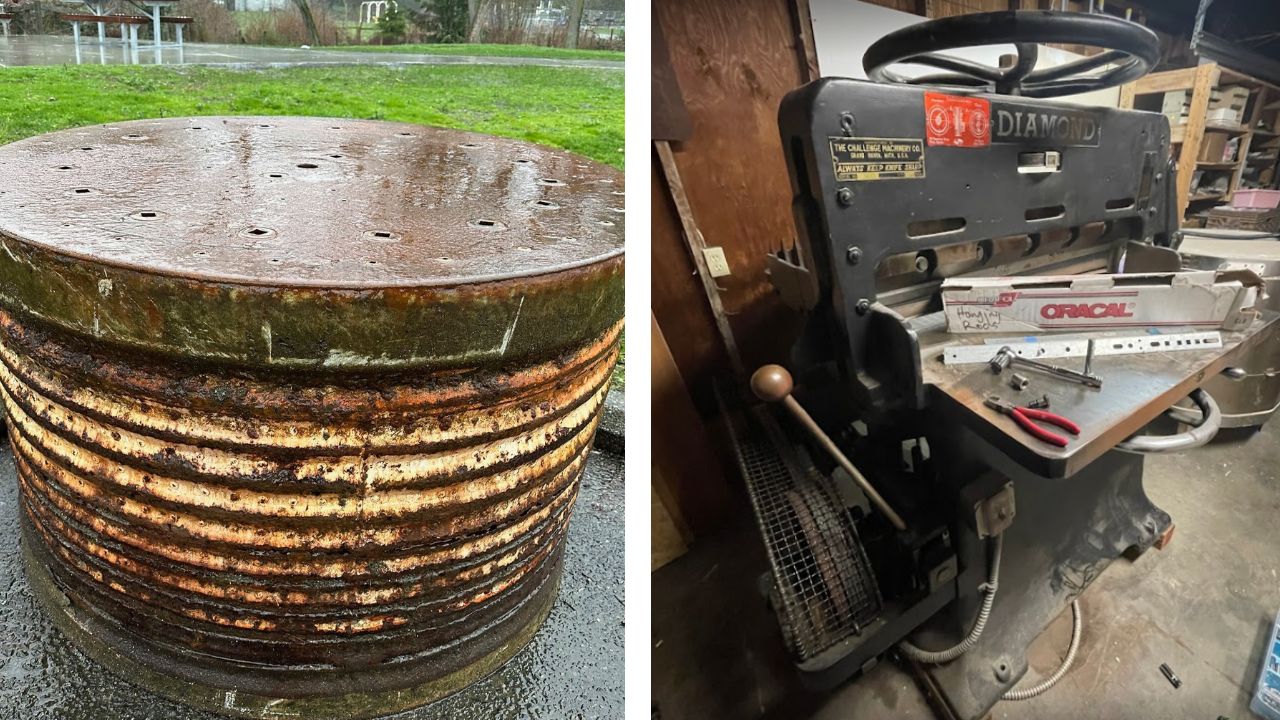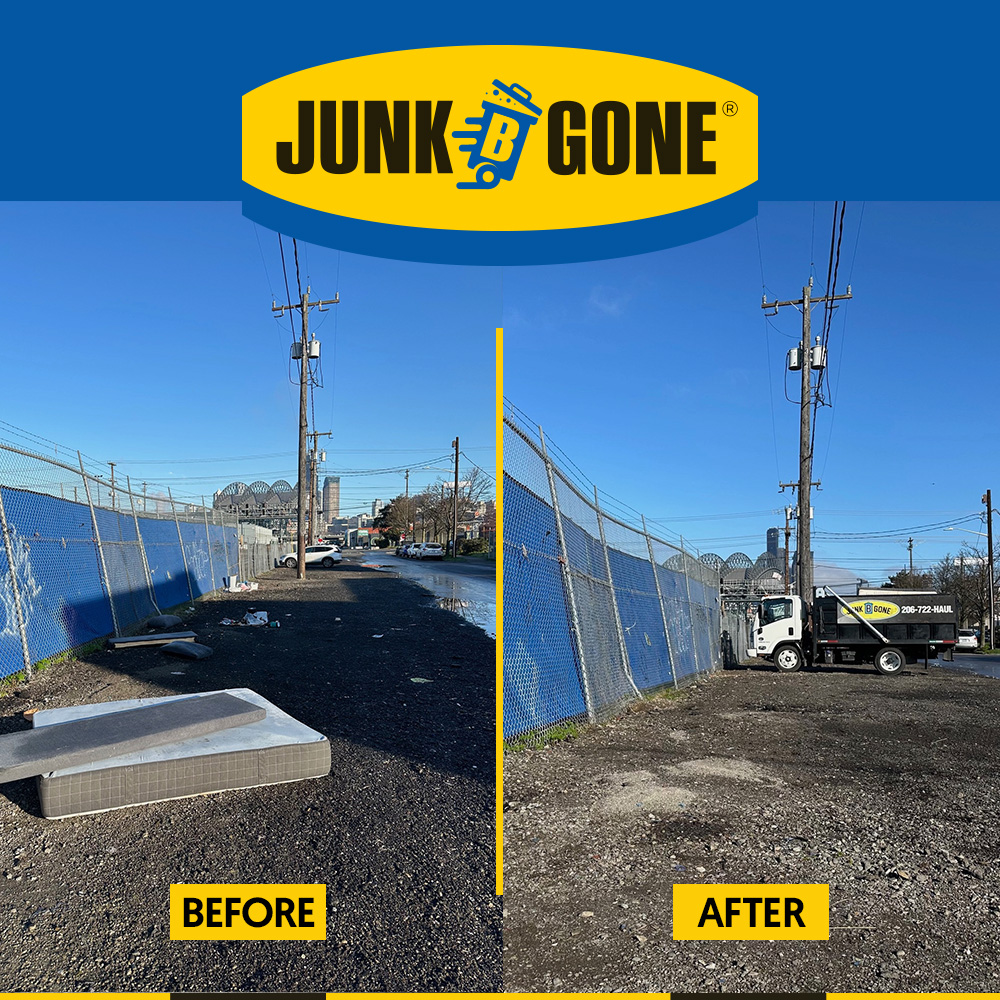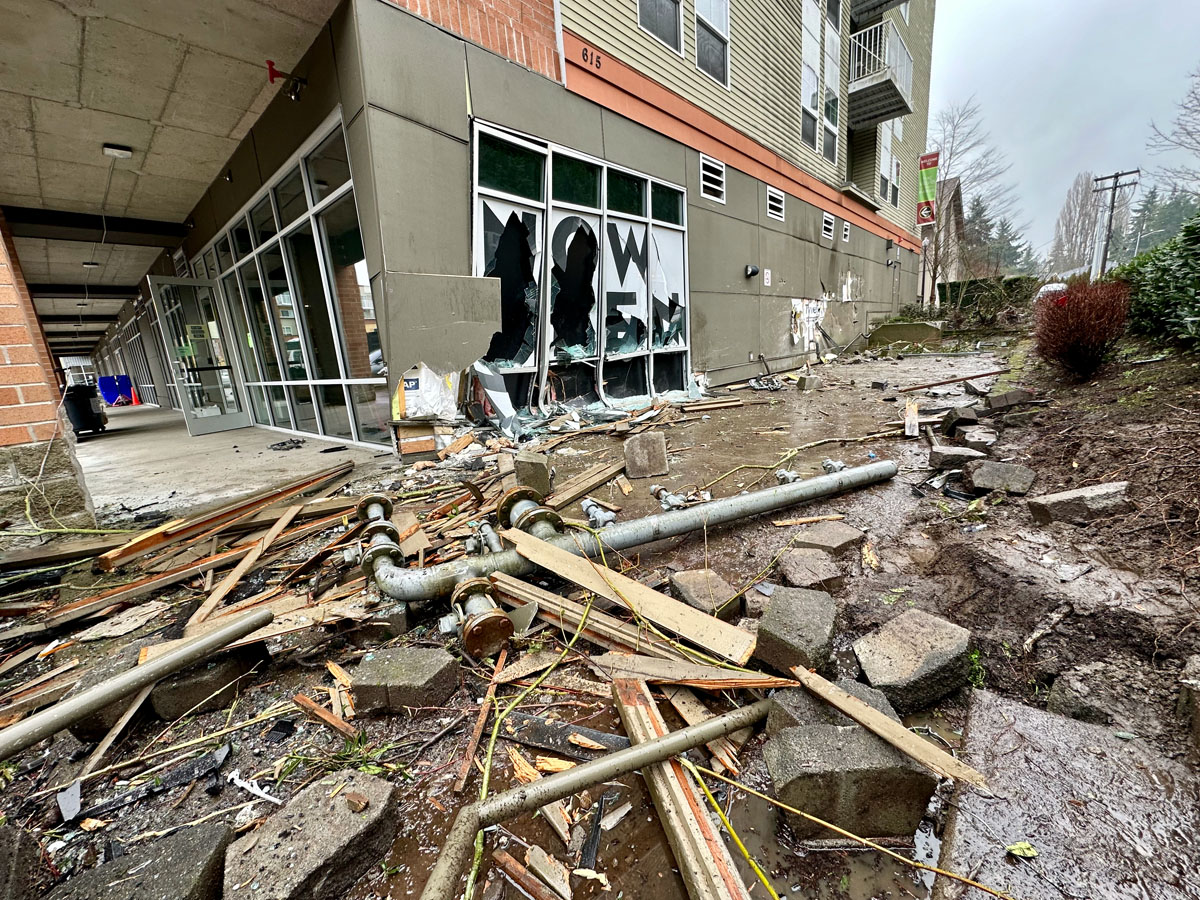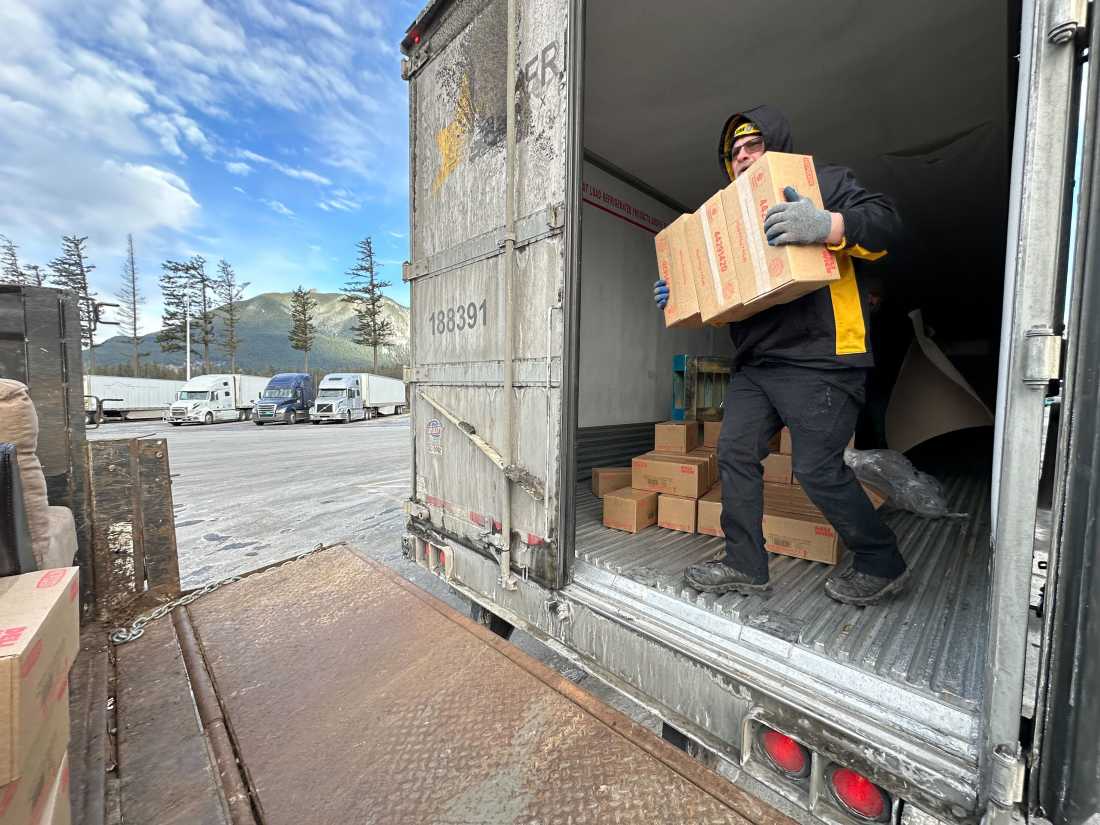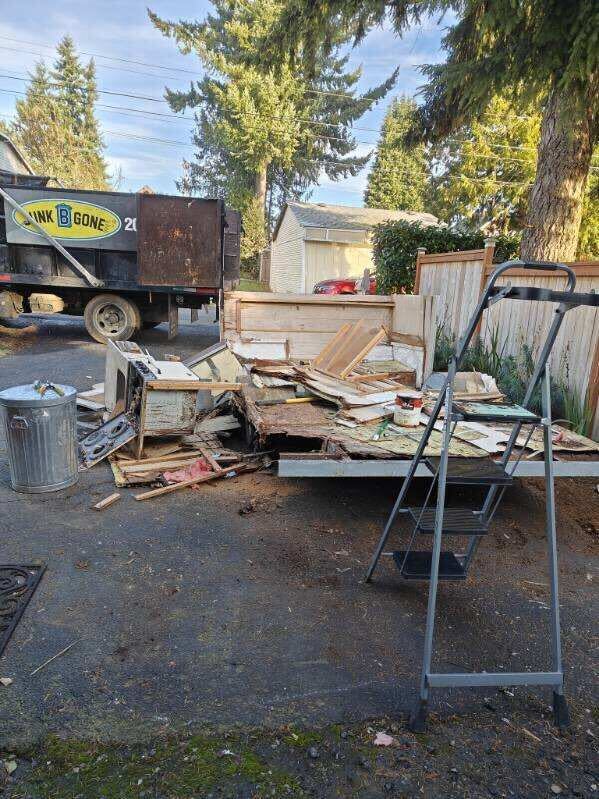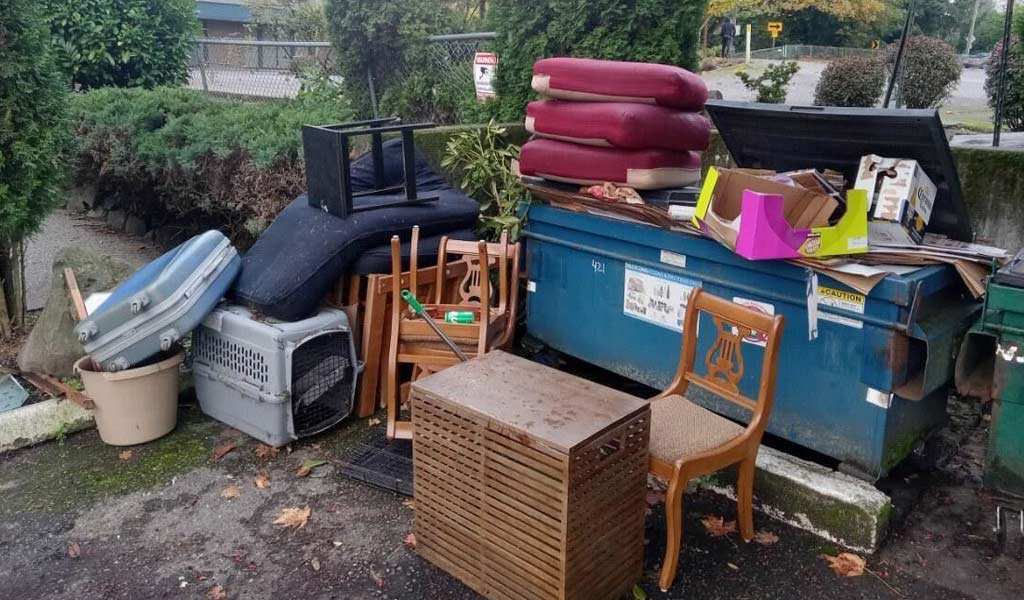Managing yard waste properly is not just a chore to keep your property tidy—it’s a crucial practice that benefits both the environment and your local community. Whether it’s leaves, branches, grass clippings, or other garden debris, how we handle this waste can have a significant impact. Proper disposal and recycling of yard waste help maintain a healthy ecosystem and reduce pollution, ensuring that natural resources are preserved rather than squandered.
Every pile of composted leaves or properly disposed of branches represents a small victory for environmental stewardship. Composting, for instance, turns what would be waste into valuable organic material that enriches the soil, promoting healthier plant growth without the need for chemical fertilizers. This cycle not only sustains your garden but also reduces the amount of organic waste entering landfills, where it would decompose anaerobically and release methane, a potent greenhouse gas.
Efficient yard waste management helps prevent local nuisances and environmental hazards such as blocked storm drains and watercourses, which can lead to flooding and water pollution. It’s not just about avoiding unsightly heaps of garden refuse; it’s about contributing to a broader effort to protect and enhance our local environments.
What Constitutes Yard Waste?
Yard waste, often referred to as garden waste or green waste, encompasses all organic debris generated from routine yard and garden maintenance. This type of waste is biodegradable, which means it can be broken down into simpler organic compounds, making it a prime candidate for eco-friendly disposal methods like composting or mulching.
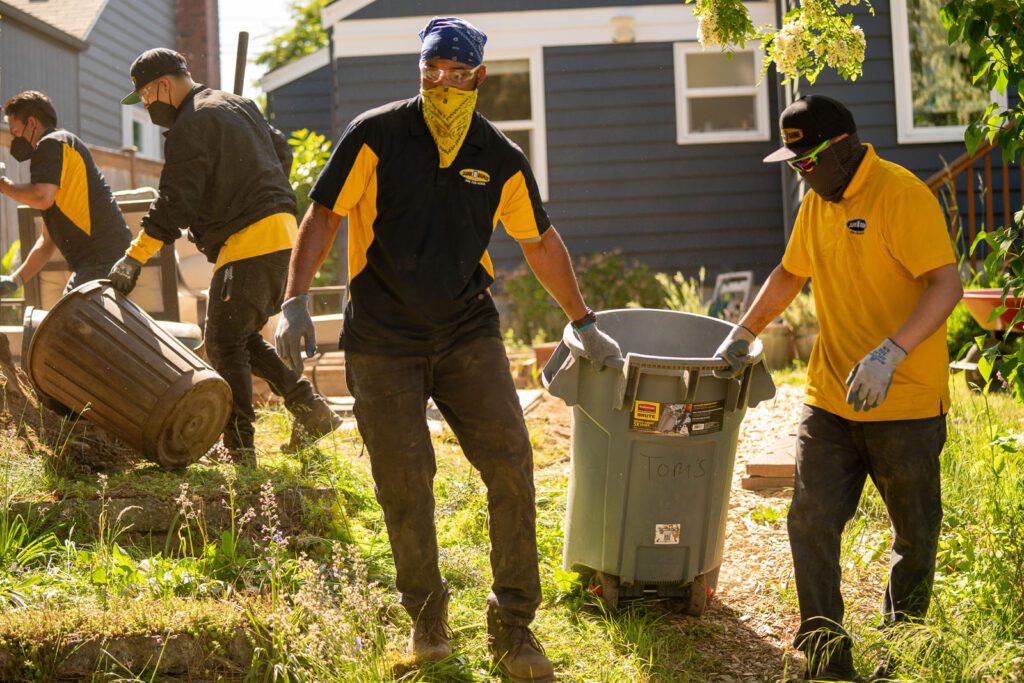
Common Types of Yard Waste
- Leaves: One of the most abundant sources of yard waste, fallen leaves can accumulate quickly, especially during autumn.
- Grass Clippings: Produced from regular lawn mowing, grass clippings are rich in nitrogen, making them excellent for composting.
- Branches and Twigs: Pruning and trimming trees and shrubs contribute substantial amounts of branches and twigs to yard waste.
- Floral Debris: Old flowers and plants, once removed, also form part of yard waste.
- Weeds: Weeding your garden produces yard waste that needs to be handled carefully, especially if it includes invasive species.
Sources of Typical Yard Waste
Virtually any activity that involves garden maintenance will generate some form of yard waste. Whether you’re:
- Mowing the lawn: Regular lawn care is a major source of grass clippings.
- Pruning: Keeping your trees and bushes healthy involves cutting away dead or overgrown limbs, generating branches and twigs.
- Raking: Essential for gathering fallen leaves and other debris scattered across your yard.
- Gardening: Removing old plants, weeds, or flowers as you manage and renew plant beds.
Each of these activities contributes to the pile of organic materials that, if not properly managed, can become more than just an eyesore. They can also attract pests and create other maintenance issues. However, with the right approach, these natural by-products of a beautiful yard can be transformed into something beneficial for your garden.
How Should I Dispose of Yard Waste?
Disposing of yard waste responsibly not only keeps your property clean but also contributes positively to the environment. Here are some effective methods you can adopt:
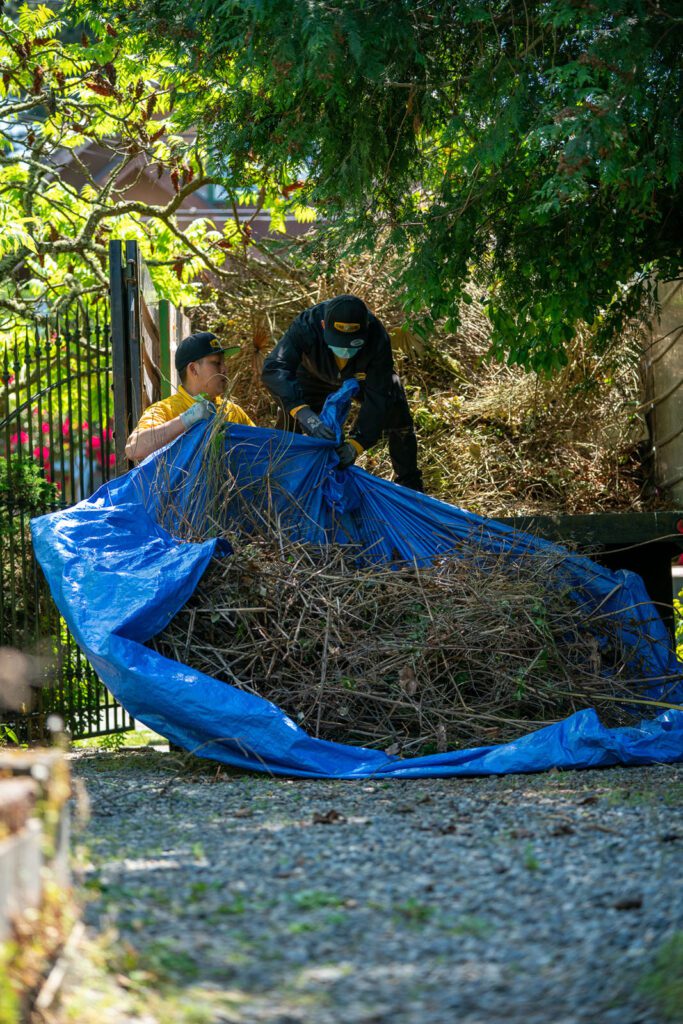
Composting
Transforming your yard waste into compost is an excellent way to recycle nutrients back into your garden.
- Set up a compost bin: Allocate a space in your yard for a compost pile or bin where you can add organic waste.
- Balance green and brown materials: Ensure a good mix of green waste (like grass clippings and vegetable scraps) and brown materials (such as dry leaves and branches) to speed up the decomposition process.
- Turn regularly: Aerating the pile by turning it occasionally will help to decompose the material faster and prevent odor.
Mulching
Using yard waste as mulch is another sustainable disposal method that can benefit your garden.
- Direct application: Spread grass clippings, leaves, or shredded branches directly over your soil to help retain moisture, suppress weeds, and add nutrients.
- Use a mulcher: If you have larger branches or twigs, use a wood chipper or mulcher to break them down into a finer consistency suitable for mulching.
Local Yard Waste Collection Services
Many municipalities offer curbside pickup or designated drop-off sites for yard waste, which they often recycle into compost.
- Use biodegradable bags: When preparing yard waste for pickup, use paper yard waste bags or designated bins as required by your local waste management rules.
- Check local schedules: Be aware of the pickup schedule and any seasonal programs that might be offered by your local community for yard waste disposal.
Hiring Professional Yard Waste Removal Services
For larger projects or if you don’t have the means to compost or mulch yourself, consider hiring a professional yard waste removal service.
- Research local services: Look for companies in your area that specialize in green waste disposal.
- Ensure proper disposal: Choose a service that commits to environmentally responsible methods, like turning the waste into compost or mulch, rather than simply taking it to a landfill.
By adopting these practices, not only do you keep your yard tidy and healthy, but you also make a significant contribution to reducing landfill waste and enhancing the sustainability of your local environment. Each method of yard waste disposal has its own benefits, so you can choose the one that best fits your gardening style and local regulations.
What are the best practices for composting yard waste?
Composting is a fantastic way to transform your yard waste into a valuable resource for your garden. Here’s how you can maximize the effectiveness of your composting efforts:
Getting Started with Composting
- Choose the Right Location: Select a dry, shady spot near a water source for your compost pile or bin. Accessibility is key for adding materials and turning the pile.
- Start with a Layered Foundation: Begin your compost pile with a layer of coarse material, such as small branches, to improve aeration and drainage.
Building Your Compost Pile
- Mix Materials: A healthy compost pile needs a good balance of ‘greens’ (nitrogen-rich materials like grass clippings and vegetable scraps) and ‘browns’ (carbon-rich materials like leaves and twigs).
- Chop or Shred Larger Pieces: Smaller pieces decompose faster. Chop or shred yard waste to speed up the composting process.
- Maintain Moisture: Your compost should be moist, but not soggy. Sprinkle water occasionally or let rain do the work if your pile is not covered.
Turning and Maintenance
- Turn Regularly: Oxygen is essential for composting. Turn your pile every few weeks to aerate it, which helps to speed up the decomposition process and prevent odor.
- Monitor Temperature: A compost pile that’s working well will generate heat. If it’s cool, it might need more green materials, more water, or more frequent turning.
Using Your Compost
- Know When It’s Ready: Finished compost is dark, crumbly, and earthy-smelling. It generally takes four to six months to become fully processed.
- Application: Use your compost to enrich garden soil, support plant growth, and reduce the need for chemical fertilizers.
Troubleshooting Common Issues
- Odors: Bad smells could mean too much moisture or not enough air. Turn the pile more frequently and add browns to absorb excess moisture.
- Pests: To discourage pests like rodents, avoid adding meats, dairy products, or fats to your compost. A well-maintained and balanced compost should not attract pests.
By following these best practices, you can turn yard waste into a nutrient-rich compost that benefits your garden tremendously. Not only does this practice support sustainable gardening, but it also helps reduce your environmental footprint by minimizing waste.
How can I use yard waste as mulch or fertilizer?
Transforming your yard waste into mulch or fertilizer is an excellent way to enhance the health of your garden while reducing waste. Here’s how to put your yard debris to good use in a way that benefits your plants and soil.
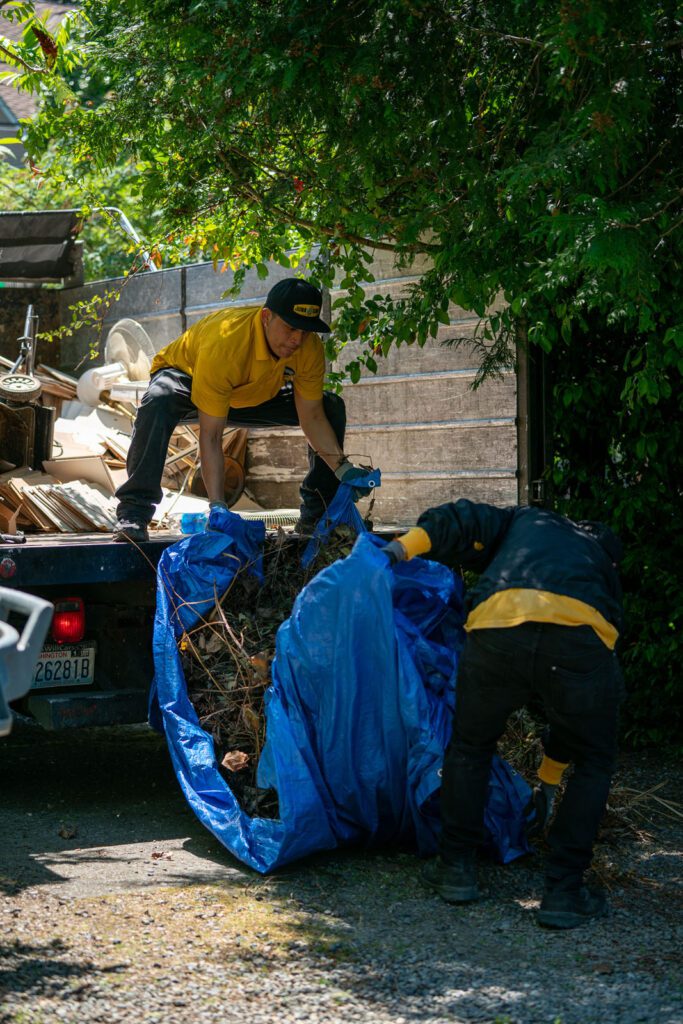
Turning Yard Waste into Mulch
- Choose the Right Material: Not all yard waste is suitable for mulch. Ideal materials include leaves, grass clippings, and small branches that have been chipped or shredded.
- Application: Spread a layer of your homemade mulch around plants, trees, and over bare soil. This layer should be 2 to 4 inches thick. Mulch helps retain soil moisture, suppress weeds, and regulate soil temperature.
- Decomposition and Nutrient Release: As the organic materials slowly break down, they release nutrients into the soil, improving its fertility over time without the need for chemical fertilizers.
Using Yard Waste as Fertilizer
- Composting First: To use yard waste as fertilizer, it’s best to compost it first. Composting converts yard waste into a more nutrient-rich form that is easier for plants to absorb.
- Direct Application: If you choose to use fresh yard waste as a direct fertilizer, such as fresh grass clippings, apply them sparingly. Fresh clippings can be high in nitrogen and might overwhelm plants if applied too thickly.
Benefits of Mulching and Fertilizing with Yard Waste
- Soil Health: Both mulching and applying compost improve soil structure, aeration, and water retention, fostering a robust garden ecosystem.
- Cost-Effective: Using your yard waste saves money on garden products and reduces the amount of waste sent to landfills.
- Environmental Impact: By recycling your garden waste on-site, you decrease the carbon footprint associated with hauling away and processing green waste.
Best Practices
- Avoid Diseased Material: Be cautious not to use diseased plants or those treated with pesticides as mulch or in your compost, as these can spread problems to other parts of your garden.
- Layer Appropriately: When mulching, keep the material a few inches away from plant stems and tree trunks to prevent rot and discourage pests.
Using yard waste as mulch and fertilizer not only enriches your garden but also embraces an eco-friendly approach to gardening. By recycling and repurposing organic waste, you contribute to a sustainable cycle that benefits your garden and the environment alike.
What services are available for yard waste removal?
When the volume of yard waste exceeds what you can manage through composting or mulching, or if you simply need a quicker disposal option, various services can help. Here’s a look at the yard waste removal services typically available to homeowners.
Municipal Curbside Collection
- Scheduled Pickups: Many cities and towns offer curbside pickup for yard waste, which may be scheduled weekly, bi-weekly, or seasonally depending on the locality.
- Guidelines: It’s important to follow your municipality’s guidelines for yard waste removal, which often include using specific types of bags or bins and adhering to weight and size limits.
Professional Yard Waste Removal Services
- Full-Service Removal: For larger or more complex yard cleanups, professional yard waste removal companies can be hired. These services are particularly useful for post-storm cleanups or major landscaping projects.
- Benefits: Hiring a professional service ensures that all types of yard waste are handled efficiently and transported for proper disposal or recycling, saving you time and effort.
Local Drop-Off Sites
- Community Depots: Some areas provide community yard waste depots where residents can drop off their green waste. This service is often free, though it may have restrictions on the type and amount of waste accepted.
- Recycling Centers: Dedicated green waste recycling centers are equipped to handle large amounts of yard debris, turning it into compost or mulch that might even be available for residents to use.
Subscription Services
- Regular Pickups: If your area lacks municipal pickup or you need more frequent service, private subscription-based yard waste removal services might be available. These services provide you with the necessary bins and come on a scheduled basis to collect your yard waste.
By utilizing these yard waste removal services, you can ensure that your garden remains tidy and your waste is disposed of responsibly, contributing to local recycling and composting efforts. Whether you choose a municipal, professional, or private service, there’s an available solution to meet every landscaping need.
Are there any local regulations I should be aware of for disposing of yard waste?
Understanding and adhering to local regulations is crucial when disposing of yard waste. These rules are designed to protect the environment and ensure that waste disposal processes are safe and sustainable. Here’s how you can stay informed and compliant:
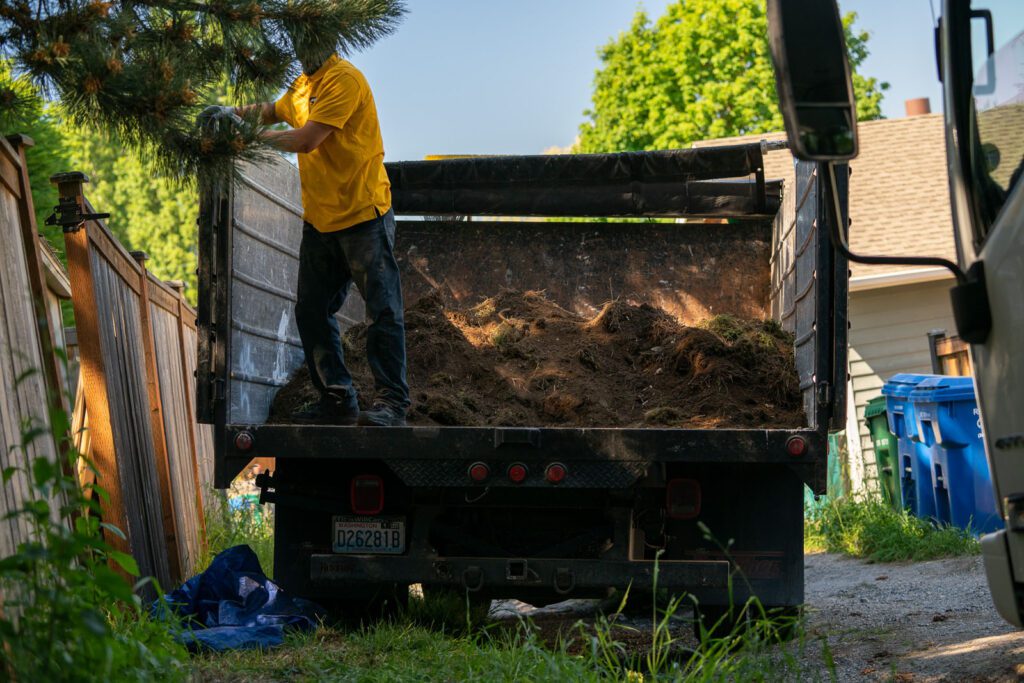
Check Municipal Regulations
- Waste Management Policies: Most municipalities have specific guidelines on how yard waste should be disposed of. These can include the types of materials accepted, how they should be prepared for pickup, and the designated days for collection.
- Seasonal Guidelines: Some areas may have different rules depending on the season, especially in regions with significant leaf fall in autumn or grass growth in spring.
Understand Composting Regulations
- Home Composting Rules: While composting is encouraged in many areas, some localities may have regulations about the size and location of compost piles or bins to prevent nuisances like smells or pests.
- Commercial Composting Facilities: If you choose to take your yard waste to a commercial composter, they will also be regulated by local laws ensuring that their operations do not negatively impact the environment.
Restrictions on Burning Yard Waste
- Burning Bans: Many places strictly regulate or completely ban the burning of yard waste due to air quality concerns and fire risks. Always check if burning is allowed in your area and under what conditions.
- Permit Requirements: In areas where burning is permitted, you may need to obtain a permit from local fire departments or environmental agencies.
Why Compliance Matters
- Environmental Protection: Following local regulations helps protect your local ecosystem from potential harm caused by improper disposal techniques.
- Avoiding Penalties: Non-compliance can lead to fines or other penalties. Being informed and adherent protects you from legal issues.
By being proactive about understanding local regulations, you can ensure that your yard waste disposal methods are not only effective but also legally compliant and environmentally responsible. This commitment helps maintain the health and beauty of your community and the wider environment.
What should I do with yard waste during different seasons?
Managing yard waste effectively requires adapting your strategies to suit different seasons, as the type and volume of waste can vary significantly throughout the year. Here’s how to handle yard waste during each season:
Spring
- Garden Prep and Cleanup: Spring is a time for clearing away winter debris and preparing gardens. Collect and compost dead plants and leftover leaves to enrich your soil for planting.
- Grass Clippings: As mowing becomes a regular task, consider grasscycling by leaving clippings on the lawn to decompose and nourish the grass naturally.
Summer
- Maintaining Compost: The warm weather accelerates composting. Regularly turn your compost pile to aid decomposition and prevent odors.
- Mulching: Use summer grass clippings and shredded leaves as mulch to help retain soil moisture and suppress weeds, which are prevalent during these warmer months.
Autumn
- Leaf Management: Fall generates significant amounts of leaves. Rather than bagging them all for disposal, use them as a protective mulch for winter or add them to your compost heap.
- End-of-Season Pruning: Collect branches and twigs from pruning and consider chipping them for mulch or adding smaller pieces to your compost.
Winter
- Christmas Trees and Wreaths: After the holidays, many municipalities offer specific programs to recycle Christmas trees and greenery, which are often turned into mulch.
- Winter Pruning: Gather branches and other woody materials from winter pruning and store them for chipping in the spring or add to the compost if they are small enough.
Tips for All Seasons
- Storage Solutions: If seasonal services are limited, store yard waste in a designated area until it can be disposed of or used. Make sure it’s covered or contained to prevent it from blowing away.
- Continuous Composting: Maintain your compost pile year-round by adjusting its location or composition to suit seasonal changes in temperature and moisture.
By tailoring your yard waste management techniques to the specific needs of each season, you can maximize the health of your garden and minimize the impact on the environment. This cyclical approach not only enhances your landscape’s beauty and functionality but also contributes to a sustainable gardening practice that benefits the entire ecosystem.
Managing yard waste effectively throughout the year is not just a task—it’s an opportunity to enrich your garden, conserve resources, and contribute to a healthier environment. Each season brings its own set of challenges and opportunities for yard waste disposal, from spring cleanups that rejuvenate your garden to autumn leaf piles that can be transformed into nutrient-rich compost.
By understanding the best practices for composting, recycling, and utilizing yard waste as mulch or fertilizer, you can turn what might seem like mere debris into valuable resources for your garden. Local removal services and adherence to municipal regulations ensure that larger or more challenging yard waste is handled responsibly, keeping our communities clean and sustainable.
Adjusting your yard waste strategies with the changing seasons ensures that your garden remains vibrant and well-maintained year-round, while also protecting the natural environment. Whether you’re composting, mulching, or utilizing community services, the effort you put into disposing of yard waste responsibly pays dividends in the form of a lush, flourishing landscape and a reduced ecological footprint.

